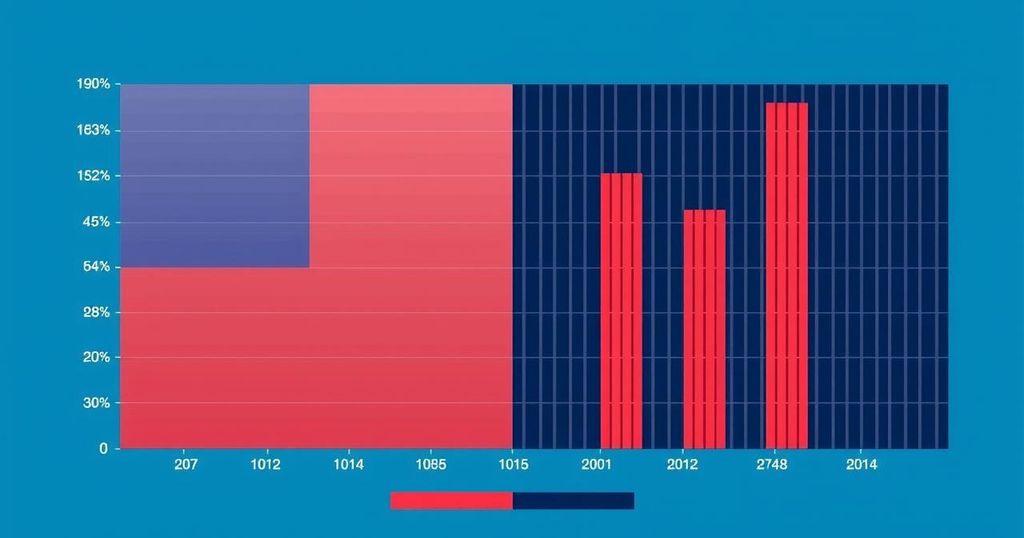Georgian elections held on October 26, 2024, have been contested by opposition claims of voter fraud against the ruling party, Georgian Dream. Preliminary results indicated a controversial 56% victory for GD, while opposition exit polls suggest they received 51.9% collectively. Concerns have been raised regarding election violence and voter intimidation, highlighting the need for independent scrutiny of the electoral process.
On October 26, 2024, Georgians participated in significant elections, which marked the most pivotal voting event since 2003. The ruling party, Georgian Dream (GD), declared a decisive victory amid allegations of electoral fraud from opposition parties and various observers. Prime Minister Iralki Kobakhidze proclaimed a “landslide” victory for GD, despite contradicting results from exit polls conducted for pro-opposition outlets, indicating that GD garnered only 40.9% to 42% of the votes, compared to the four opposition groups, which collectively received 51.9% to 48%.
The preliminary results released by Georgia’s Central Election Commission (CEC) indicated GD secured 56% of the votes, based on 99% of counted districts, yet scrutiny from the BBC questioned the legitimacy of this outcome. Concerns were raised over the CEC’s perceived proximity to the ruling party, compounded by reports of widespread election violence which cast doubt on the validity of the results. The coalition of election observers, known as My Vote, remarked that the extent of voter fraud made it improbable that the CEC’s preliminary results were credible.
Numerous opposition figures highlighted discrepancies between official state data and their collected information during the electoral process. Meanwhile, Prime Minister Kobakhidze acknowledged the need to address electoral irregularities but insisted that the overarching conduct of the elections was consistent with democratic principles. Conversely, Eklund, a former EU ambassador, asserted that “Voter intimidation…up to and on election day severely undermined the process.”
Interestingly, the year 2023 has been marked by an unprecedented number of elections globally, with at least 70 countries, encompassing nearly half of the world’s populace, engaging in electoral processes. Although this reflects a commitment to democratic engagement, many elections have been marred by violence and democratic regression, Georgia being one among several instructive examples. With a history of electoral misconduct, observers and civil societies worldwide play a vital role in safeguarding electoral integrity.
For over a decade, the GD party has maintained power in Georgia, focusing their election campaign on the implications of the ongoing conflict in Ukraine. Through advertisements, they suggested that opposition parties would threaten national security and potentially hasten involvement in another conflict akin to the 2008 Russian war. This rhetoric resonated with voters, particularly in light of Georgia’s eligibility for European Union membership, which was recently stalled due to anti-Western sentiments propagated by GD. Additionally, the passage of a controversial ‘foreign influence’ law further escalated civic unrest as protests ensued against perceived threats to Georgian democracy. With GD’s consolidation of power, the nation is likely to strengthen ties with Moscow, reinforcing Russia’s influence over the region.
The electoral landscape in Georgia has been tumultuous, with the ruling Georgian Dream party facing accusations of electoral falsification since its inception twelve years ago. The 2024 elections represented a critical moment as citizens exercised their democratic rights. In recent years, various instances of electoral violence and intimidation have compromised the stability of democratic processes in many nations, with Georgia experiencing similar challenges. Amid geopolitical tensions and the desire to join the European Union, internal politics have become intertwined with foreign influences, shaping the current political discourse.
In summary, the recent elections in Georgia sparked serious allegations of voter fraud and electoral violence, raising questions regarding the legitimacy of the ruling party’s asserted victory. The systemic challenges facing Georgian democracy, compounded by pressures from both internal opposition and external influences, necessitate thorough investigations into the electoral process. The international community’s role in safeguarding electoral integrity remains critical, particularly as nations around the world navigate similar challenges to democratic principles.
Original Source: theowp.org






